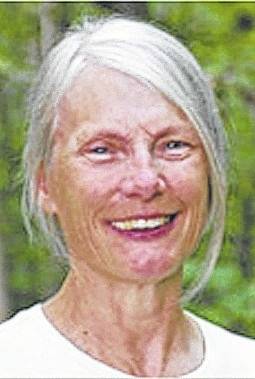
Although Stratford Ecological Center on Liberty Road continues to be closed to the public, we are grateful for the opportunity to keep everyone abreast of life on the farm through this “Farm Connection” article published monthly in the Delaware Gazette.
The Stratford Farm School program started Sept. 1 with eight 6- to 8-year-old children, each attending for one day, Tuesday through Thursday. The children have responded well, and the days have flowed smoothly. There is no shortage of experiences and learning opportunities to share with them on our 236 acres.
Prior to the first day of Farm School, over 50 pairs of assorted donated rubber boots were removed from the crowded entryway and stored in the library. The empty bookcase was stocked with smaller sizes in anticipation of wet conditions. This happened on Sept. 8 after 2.5 inches of welcome rain fell overnight. The stream flowed, and like the stories from children all over the world, the water poured over the top of those boots and the kids loved it!
We are unable to host the fifth grade Messages from the Earth Science Program this fall. Katryn Renard and volunteers produced a video explaining the process of photosynthesis in a fun way using the leaf structure in the woods. The video will be offered to participating teachers to share with students on their days at home.
The Earth Science Program is usually conducted outside, but there are days when it is too windy to expose the children to the danger of falling trees in the woods. So, this low-key summer provided Katryn with the opportunity to develop Windy Day Projects that could be done under cover. She was assisted by Messages volunteer Carl, and their efforts proved to be worthwhile as some of the projects are better than existing ones and will likely be a permanent fixture in future curricula.
Volunteer beekeeper Kent Larsson and his team spent a long day using a hot knife to scrape off the wax cap from honey frames, then spinning 12 frames at a time for 15 minutes in a centrifuge to separate the honey. The honey was strained and stored in buckets to await bottling. This is the last honey haul of the season as the bees will consume the remainder during the winter. The bees continue to utilize the nectar from the blooming ragweed, asters, and goldenrod to increase their supplies. There are plans afoot to practice safe distancing and hold a sale of honey and maple syrup at a future date to be listed online.
Farmhands have been removing weed from the pond. When standing on the bank, they drag a knife-like tool through the weed to cut it down. A farmhand sitting in our metal canoe scoops it up and paddles it back to shore to be unloaded and carted off to decompose. The canoe leans precariously during loading and sinks lower and lower as it fills up, but no one has ended up in the water yet! The weed is worse this year because the pond half-emptied during restoration work last fall, and the combination of a mild winter, shallow water, and sunlight have enabled lush growth!
Three solar panels have been installed on the south side of the lower roof of the Prairie Pavilion located next to the pond. They are now producing electricity to run two bubblers which keep the pond oxygenated to ensure the survival of the fish and control the weed. Scaffold was erected to reach the roof and enable the installers to secure the panels in place. A trench was dug from the Pavilion to the pond, and a conduit laid to the pump which provides air for the bubblers. Farmhands and staff were integrally involved in the effort and are to be applauded for their versatility.
Farmer Jeff drove Tansy, our sow, back to her previous owner in New Philadelphia on Aug. 27. Tansy knew she was home and ran happily across the pasture. She will be bred and there is some question whether she will return. If not, we would receive another sow and hopefully she will take a liking to Buddy, the farm dog whom Tansy could never tolerate.
On the way home, Farmer Jeff stopped in Millersburg and picked up corn and soybeans for our feed mix. He buys either non-GMO or organic, and as prices have dropped, he was able to buy organic. We grow our own corn but usually buy a little to fill the gap between seasons. This year we grew 50% more thanks to donated seed and should have enough to carry us through a full year.
The pasture has recovered from the dry spell and can be grazed through early winter. There will be no more haying this season. With 1,700 bales in the loft, there is enough to feed through the winter. The squash has done well planted between fields 1 & 2, and it is about ready to harvest. Normally, the vines are attacked by stink bugs, but after hatching early in the spring, they were killed by late frosts.
Three goats, three lambs, and a ram left for Dee Jay’s the processor on Sept. 13. In December, a cow and a hog are scheduled to go, which means our freezers will be well-stocked. Meanwhile, we can all enjoy the cooler weather and fall color in Ohio by taking advantage of any opportunity to be outside. Stay safe.


